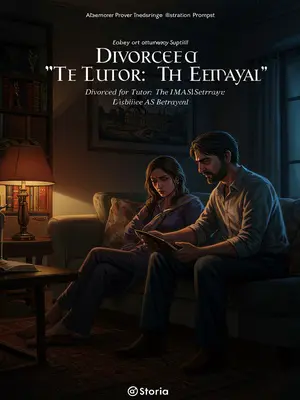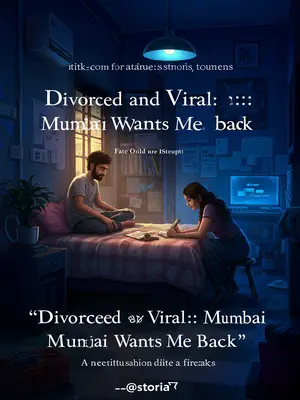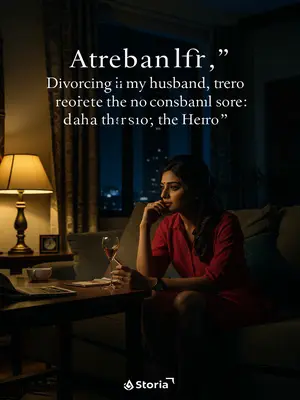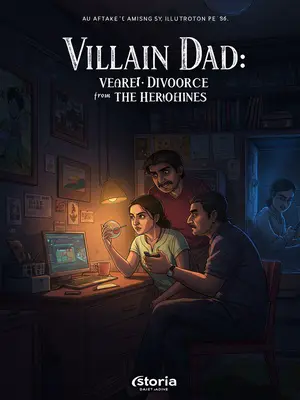Chapter 1: Three Years Married
The aroma of freshly brewed filter coffee drifted in from the kitchen, curling around my senses as the newspaper boy knocked on our door with his usual three sharp raps. Three years married, and still not ready for the questions that came with it. In our society, the third anniversary means neighbours start whispering, the building aunties corner me near the lift, eyebrows waggling: “Koi khush khabri, beta?” My mother-in-law’s voice rings in my ears—'Beta, after three years, you should start thinking of settling down properly.'
He is thirty-five. A man considered mature and responsible by everyone—at the perfect age to have it all, as they say in our family WhatsApp group.
I’m not even twenty-one yet, just a final-year college student. Sometimes, while rushing for my 8:40 am lectures in a faded kurta and hastily applied kajal, I’m reminded of how much younger I am than him. In our flat, his blazers hang beside my salwar suits, my textbooks scattered among his files on the dining table.
I haven’t even decided if I want to become a full-time housewife. A part of me still craves the freedom to roam Marine Drive with friends, drink cutting chai at roadside stalls, maybe even pursue a postgrad degree. I’m not ready to let go of my dreams just yet, no matter what everyone expects.
Then one day, I overheard him chatting with a group of industry big shots. They were gathered in the plush lounge of The Oberoi, swirling glasses of whiskey, voices lowered but still clear if you cared to listen—which, of course, I did. The heavy scent of attar and imported cigars hung in the air.
"Sneha is only good for her youth. Compared to her, Priya is far more intellectual."
His words stung like a slap. As if being young was my only worth, as if intelligence had nothing to do with me at all. Heat rose to my cheeks, my hands growing cold. I pressed my dupatta to my lips, the way Amma taught me when words threatened to spill out.
"Honestly, I’m starting to regret getting married. How much does it really cost to keep a young girl? If I get divorced now, the loss will be too much."
A couple of the men nodded, laughing in that sly, knowing way older uncles do when talking about 'women’s expenses'. My stomach twisted. I’d never imagined Arjun would speak about me like that—as if I were an asset to be calculated, not a person with a heart.
I turned around and handed him the divorce agreement. My hands fidgeted with my mangalsutra, feeling its weight, before I placed the papers in front of him—a gesture Amma always said meant more than a hundred words. The thick silence that followed made everyone stare. Someone coughed, another pretended to scroll through his phone. Arjun’s eyes widened. The paper between us felt heavier than any words.
When he saw the line on the plain white paper—‘I will leave with nothing’—he let out a long sigh of relief. It was a familiar sound, one I’d heard late at night when he was tired or frustrated. Only this time, the relief in his voice was sharper, almost selfish. He didn’t even hesitate.
Pretending to be generous, he said, "I’ll transfer you two crore as compensation." He tried to look magnanimous, as if he was doing me a favour. But his voice had that same calculation, the same coldness. He didn’t know I’d never wanted his money in the first place.
I smiled and declined. "I’m still young. I can start over." My smile was steady, my voice light, but inside I was burning. I remembered the line from an old Hindi film—'Zindagi mein izzat sabse badi cheez hai'—and Amma’s lesson that pride is worth more than money. My pride—my amma’s upbringing—would not let me accept even a rupee from him.
He doesn’t know—my brother is the prince of Mumbai’s social scene, the kind of man everyone respects in the city’s most powerful circles. The only reason Arjun managed to squeeze into those circles these past few years was because of my brother’s support.
People whispered about my brother—Rohan Malhotra—at every party, every fundraiser, every Ganpati pandal in the city. Even the police commissioner would greet him respectfully. If Arjun was invited anywhere, it was because of my brother’s nod, not his own merit. I’d never mentioned this to Arjun, wanting him to feel he stood on his own feet.
Divorcing me? His real losses have only just begun.
As the elevator doors closed, I caught a glimpse of Arjun’s anxious face. My mind was already calculating which doors would quietly close on him, which calls would go unanswered, which deals would suddenly fall through. The world in Mumbai is small when you have the right connections, and my brother’s shadow stretches longer than Arjun can imagine.













